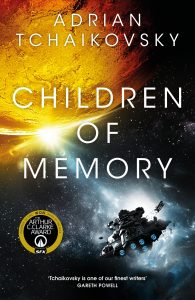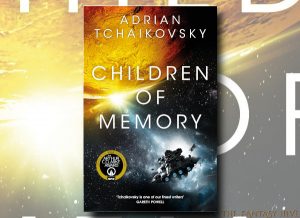CHILDREN OF MEMORY by Adrian Tchaikovsky (BOOK REVIEW)
Having finished 2022 with Walking to Aldebaran I opened 2023 with another Tchaikovsky work Children of Memory, the third (and last?) in the series that began with Children of Time and continued with Children of Ruin.
I was juggling my reading of Children of Memory alongside starting an ARC of Mark Lawrence’s The Book that Wouldn’t Burn and delving into Russell Jones The Decade in Tory. I found it strange that themes from three very disparate books seemed to merge in my mind as I read Children of Memory. Tchaikovsky’s vision of a child Liff in a desperate colony scratching out a fragile existence in a far future of science fiction resonated with Lawrence’s opening of a child Livira scratching out a fragile existence in the barren desert of the water starved pale beyond a fantasy city. Tchaikovsky’s depiction of a populace filled with fear and poverty and turning that fear into irrational hate against outsiders and refugees resonated with so many of the political ills Jones was busily skewering with humour as dark as it is true.
It is kind of ironic, that blurring of boundaries and tangled memories should have been stimulated by Tchaikovsky’s work which is itself flooded with blurred boundaries and tangled memories.
While I will try to keep this review as spoiler free as I can for Children of Memory, there will inevitably be spoilers for Children of Time and Children of Ruin, so if you haven’t read them yet you should probably start them and/or stop reading this review now.
 There is a progression in Tchaikovsky’s exploration of the alien that rivals both the Polynesian exploration of the Pacific Ocean and humanity’s tentative forays into space. There is that same staged process radiating outwards in ever greater leaps of distance (or imagination). Just as (no matter what Elon Musk may think) colonisation of our near neighbouring Moon is an essential precursor to any kind of prospect of terraforming Mars, so too the arachnid air-breathing single brained heroes of Children of Time paved the way for the reader’s enjoyment of the water breathing multi-brained chaos of the octopuses of Children of Ruin. In Children of Memory Tchaikovsky makes another huge leap of imagination (well several in fact) as a crew of explorers culled from the pages of the previous books – a crew so diverse that “multi-species” hardly begins to cover it – chase down more scattered remnants of old humanity.
There is a progression in Tchaikovsky’s exploration of the alien that rivals both the Polynesian exploration of the Pacific Ocean and humanity’s tentative forays into space. There is that same staged process radiating outwards in ever greater leaps of distance (or imagination). Just as (no matter what Elon Musk may think) colonisation of our near neighbouring Moon is an essential precursor to any kind of prospect of terraforming Mars, so too the arachnid air-breathing single brained heroes of Children of Time paved the way for the reader’s enjoyment of the water breathing multi-brained chaos of the octopuses of Children of Ruin. In Children of Memory Tchaikovsky makes another huge leap of imagination (well several in fact) as a crew of explorers culled from the pages of the previous books – a crew so diverse that “multi-species” hardly begins to cover it – chase down more scattered remnants of old humanity.
Tchaikovsky opens with a succinct and helpful recap of the key narrative points from the previous books. In essence there were two waves of human exploration that history fired into space. First there were the arrogant ancients with formidable terraforming technology driven by Avrana Kern, who in their hubris were undone by a war of annihilation at home and the dissemination of a sabotaging virus that crippled not just their terraforming efforts but the life-support systems they depended on. And then there were the last of the humans who dragged themselves back into the space age from the husk of ruined Earth and – in desperation – sent slow moving ark ships out into space hoping to find and populate the distant Edens that Kern and her colleagues had been preparing for them.
The faster than light explorers from the end of Children of Ruin have found one of the ancients’ worlds Rourke, populated by crows (corvids) who exist and operate as pairs and engage in dialogue at times so random it is like a person trying to fail the Turing test. One pair join the crew of the Skipper on a journey to the next potential target world Imir. The rest of the Skipper’s crew consist of three spiders, one octopus, one Human, an uploaded replica of Kern’s ancient, testy and yet still learning mind and finally Miranda.
Miranda is a once parasitic entity seeded in a manufactured human body whose memories – and those of every organism she has ever “asimiliated” accidentally, deliberately or by mutual consent – are encoded in her DNA, and Miranda is looking for adventure.
They find it firstly in the fragile colony established on Imir by one of the ark ships, and secondly in Miranda’s entangled and disorientating relationship with one of the colony’s children, the girl Liff on the cusp of adolescence and somehow key to the colony’s survival.
Liff’s circumstances, a small civilisation dependent on technology it can no longer service, descending into a kind of proto-medieval life style of agriculture, beasts of burden and a vulnerability to superstition and capricious climate, give much of the book a kind of fantasy feel. As Tchaikovsky populates Liff’s mind and world with witches and wolves and impossible transformation it put me in mind of the Arthur C Clarke quote, “Any sufficiently advanced technology is indistinguishable from magic.”
Tchaikovsky’s writing is as usual, full of memorable lines, moments of insight, and sharp twists.
When Liff indulges in a bit of equivocation before as a prelude to sneaking off after lunch
“…so it’s not quite a lie and yet it does a lie’s work anyway.”
Or when Liff is trying to get Miranda to understand what she has seen and knows
“…They just think I’m crazy. But he’s there and she’s there are…” Now she stops, with her mouth crammed full of things even she won’t say for fear of knowing herself mad.
Or when Liff is trying to draw on a knowledge of distant fairy tales to navigate her way through the woods and other challenges.
“One thing about making deals with inexplicable things in the stories is that, if you’re not careful, You can receive something that is simultaneously exactly what you asked for, and not remotely what you wanted.”
One of my favourite lines delightfully references the progress in creating characters out of machines and aliens that Tchaikovsky’s Children series has gone through, when Kern rebukes Miranda.
Kern is impatient. ‘Think of it this way. You’re an alien symbiote incorporating an encoded memory of a human woman, whom you’re currently simulating with sufficient fidelity that you can believe you’re her. I’m a simulation of a different human woman who was encoded into a computer, and then spent far too long as ants before being decanted into this blank body. We neither of us have much in the way of intellectual property rights, now do we.’
There is much in the paranoia that besets the struggling Imir colony which should resonate with more local contemporary issues. As distant farms struggle and fail Imir’s solitary town of Landfall is beset by an influx of refugees and suspicion that the slow growing disaster is a matter of sabotage by persons unknown. It is the wrong time to be a stranger in town
“She knows they don’t know who they are. But that’s not important once you’ve decided there’s an us and a them. Only the fact of the division remains.”
Or this when Liff’s uncle is trying to get her to ‘understand’ where blame lies for the colony’s travails, an exchange which – for reasons unfathomable – reminded me of the Brexit vote
“Liff, no fool she, takes it in and thinks that if people don’t see it’s outsider business then maybe they’ll start thinking it’s insider business, and Molder’s telling her that would be bad for everybody’s business. Far better that these things are kept as the doings of outsiders. But in that case, you need some outsiders to do unto as you’ve been done by.”
Or when a chance remark helps Miranda in her quest to integrate
“It grounds her in the town, takes her another few steps along the spectrum that starts with them and leads to us.”
However, much as I read everything these days through the lens of contemporary politics and the manipulation of emotions, especially hate and fear, Children of Memory soars above and beyond those limits.
The philosopher Bertrand Russell was apparently dismayed at the physicists’ suggestion that the ultimate fate of the universe could see the triumph of entropy in a heat death. A circumstance billions of years away where matter and energy had become mixed and distributed with such perfect uniformity that no information or meaning could be recovered, all human history, indeed all history, lost as though stirred into a bland tepid cosmic soup.
Tchaikovsky alludes to this when Miranda reflects on the ultimate purpose of life (and the answer is not 42 in case you were wondering).
Her own culture, distributed and varied, has done its level best to future-proof itself. But there will come a time, even if it’s the heat death of the universe, when they will be gone. The living and the struggle is all. The moments of joy and sorrow, not just as stepping stones to the future, but taken on their own merits.
It is salutary perhaps for all of us to take those stepping stones on their own merits, rather than seeing them just as a path to what’s next.
However, for all the confusing and blended boundaries and memories that Liff and Miranda encounter, the real boundaries Tchaikovsky interrogates are those of self and of sentience and what it means to be human – or should I say Human. The pairing of the corvid birds – Gothi and Gethli – constantly challenge and tease the reader as to whether they are thinking, or whether they are just a kind of machine manufactured thought. As I read an article about Chat-GPT written by Chat-GPT (you can read it the Yorkshire bylines article here) one wonders what next? A Midjourney self-portrait? It seems the uncertainties over self and sentience that Tchaikovsky explores in Children of Memory might not be so distant in time and space as Miranda and the Imir colony.

